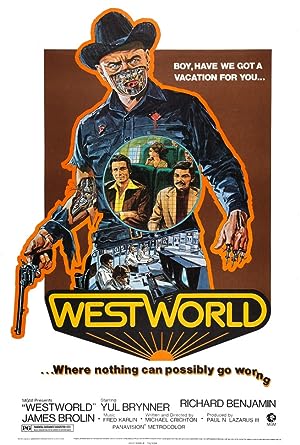I did not even know that Westworld (1973) was a movie until a friend urged me to watch the HBO series and mentioned it. I’m a completist. I can’t watch the series until I see the original so I immediately placed it in my queue to watch. Westworld (1973) is about an amusement park that only the wealthy can afford, and anything goes because it is populated by humanoid androids that are almost indistinguishable from their human counterparts. The visitors can do whatever they want to the androids without consequences until the machines begin to malfunction. Will the people in the underground control room be able to fix the problem or will the visitors have to fend for themselves? What happens when you actually have to function realistically in your fantasy? Would you survive?
Westworld (1973) is not only entertaining, but it is a piece of sci-fi film history that all sci-fi fans should see. I am forty-one years old. I feel like the universe failed me for not letting me know about Westworld (1973) sooner. Michael Crichton conceived and directed Westworld (1973), which was made after Philip Dick’s Do Androids Dream of Electric Sheep, but long before Ridley Scott’s Blade Runner and James Cameron’s Terminator franchise, which clearly owes most of its ideas to Yul Brynner’s depiction of the Gunslinger, one of the androids in Westworld (1973) and Crichton’s depiction of Judgment Day when the androids malfunction.
Westworld (1973) addresses several provocative themes in a subtle manner, which Crichton also explores in Jurassic Park, but is less apparent. First, if people have the power, ingenuity and wealth to do anything that they want to do without consequences, they will immediately engage in the worst natural human behaviors: rape and murder. (I think that I would eat everything without gaining weight.) Second, even though Westworld is not occupied by living beings, the acts perpetrated within Westworld are still real. There are atrocities, and it is slavery if someone tries to exercise complete control over anyone or anything. Third, institutional slavery, whether intentional or not, cannot last, and there will be an innate, untaught instinct to rise against the slaveholders. Fourth, even in a world designed not to have consequences because of parameters and safety controls, there is no such thing as control, only chaos, and there is no one smart, powerful or rich enough to prevent or prepare for chaos. Fifth, the people with power, ingenuity and wealth do not interpret an uprising as a natural consequence of any imbalance in power, but a programming malfunction or a virus.
Sixth, the people with power, ingenuity and wealth are literally incapable of not lying to themselves with fatal consequences. They lie about the nature of their acts. They lie about what is actually happening around them. They lie about their ability to survive. They lie about their prowess in bed and on the battlefield. They lie about everything, which brings me to the next point. Seventh, the people with power, ingenuity and wealth already have the power to do almost anything in the real world, but it is still not enough so they have to create an artificial world that lies right back to them about the nature of life, about their abilities and desirability, about lack of consequences and being immortal, which brings me back to the first point in an ouroboros fashion.
Westworld (1973) is not a perfect movie. Westworld (1973) is only 88 minutes long, but it drags in a few parts. The imagery in Westworld (1973) is haunting. Westworld (1973) echoes images of the Holocaust when the technicians emotionlessly pick up the androids’ bodies in a truck and then move them down an assembly line. I never think about Yul Brynner’s actual talent. I take him for granted especially after seeing him almost annually in The Ten Commandments, but Brynner has almost no lines, but just his physical presence is brilliant. Brynner is like The Terminator meets Michael Myers. Now that I know his performance is an homage to his earlier performance in The Magnificent Seven (1960).
Sadly I still have not had enough time to watch the HBO series, but am looking forward to seeing it. I am crestfallen that before I watch the HBO Series, I have no way of seeing Futureworld, the sequel to Westworld (1973), or the 5 episode CBS series, Beyond Westworld, which was also a sequel. If you know where I can find them, please let me know.
Stay In The Know
Join my mailing list to get updates about recent reviews, upcoming speaking engagements, and film news.





